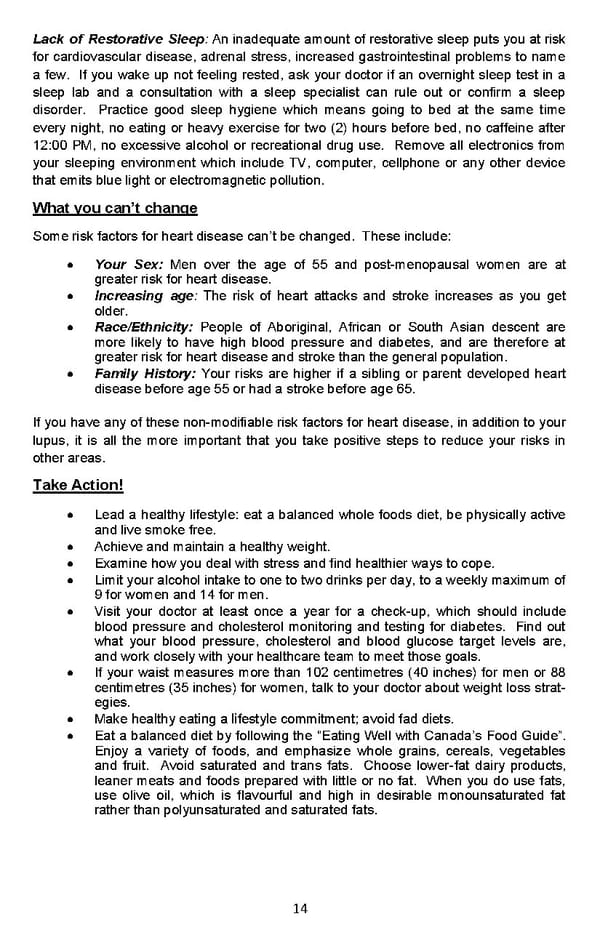Lack of Restorative Sleep: An inadequate amount of restorative sleep puts you at risk for cardiovascular disease, adrenal stress, increased gastrointestinal problems to name a few. If you wake up not feeling rested, ask your doctor if an overnight sleep test in a sleep lab and a consultation with a sleep specialist can rule out or confirm a sleep disorder. Practice good sleep hygiene which means going to bed at the same time every night, no eating or heavy exercise for two (2) hours before bed, no caffeine after 12:00 PM, no excessive alcohol or recreational drug use. Remove all electronics from your sleeping environment which include TV, computer, cellphone or any other device that emits blue light or electromagnetic pollution. What you can’t change Some risk factors for heart disease can’t be changed. These include: • Your Sex: Men over the age of 55 and post-menopausal women are at greater risk for heart disease. • Increasing age: The risk of heart attacks and stroke increases as you get older. • Race/Ethnicity: People of Aboriginal, African or South Asian descent are more likely to have high blood pressure and diabetes, and are therefore at greater risk for heart disease and stroke than the general population. • Family History: Your risks are higher if a sibling or parent developed heart disease before age 55 or had a stroke before age 65. If you have any of these non-modifiable risk factors for heart disease, in addition to your lupus, it is all the more important that you take positive steps to reduce your risks in other areas. Take Action! • Lead a healthy lifestyle: eat a balanced whole foods diet, be physically active and live smoke free. • Achieve and maintain a healthy weight. • Examine how you deal with stress and find healthier ways to cope. • Limit your alcohol intake to one to two drinks per day, to a weekly maximum of 9 for women and 14 for men. • Visit your doctor at least once a year for a check-up, which should include blood pressure and cholesterol monitoring and testing for diabetes. Find out what your blood pressure, cholesterol and blood glucose target levels are, and work closely with your healthcare team to meet those goals. • If your waist measures more than 102 centimetres (40 inches) for men or 88 centimetres (35 inches) for women, talk to your doctor about weight loss strat- egies. • Make healthy eating a lifestyle commitment; avoid fad diets. • Eat a balanced diet by following the “Eating Well with Canada’s Food Guide”. Enjoy a variety of foods, and emphasize whole grains, cereals, vegetables and fruit. Avoid saturated and trans fats. Choose lower-fat dairy products, leaner meats and foods prepared with little or no fat. When you do use fats, use olive oil, which is flavourful and high in desirable monounsaturated fat rather than polyunsaturated and saturated fats. 14
 Living Well With Lupus Facts Booklet Page 13 Page 15
Living Well With Lupus Facts Booklet Page 13 Page 15